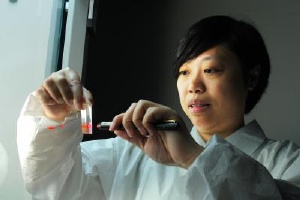Jun 3 2009
An over-the-counter prostate cancer test kit could be coming to a pharmacy near you, thanks to the collaborative work of a University of Central Florida chemist and M.D. Anderson Cancer Center Orlando researchers.
 UCF researcher Qun "Treen" Huo works with gold nanoparticles. Credit: Jacque Brund
UCF researcher Qun "Treen" Huo works with gold nanoparticles. Credit: Jacque Brund
UCF's Qun "Treen" Huo and M.D. Anderson-Orlando's Dr. Cheryl Baker and Jimmie Colon teamed up about 18 months ago with a very ambitious plan. Huo wanted to develop an effective, inexpensive test to screen for prostate cancer that would be easy enough to use at home or a local pharmacy.
"Now cancer tests are so inconvenient and expensive, and a lot of people don't have insurance, so they are not likely to test if they have no symptoms," Huo said. "Cancer is really scary because there aren't a lot of symptoms in the early stages. So I said, 'Why not create a test that is easy and inexpensive? Then more people can test and catch cancer early so it can be treated early.'"
Prostate cancer affects one of every six men and is the second-most common cancer among men in the United States, according to the American Cancer Society. It is estimated that more than 2 million American men are currently living with prostate cancer and that one new case occurs every 2.7 minutes. More than 27,000 men die from the disease each year, according to the American Cancer Society.
Huo and her team at the UCF lab developed the new technique involving gold nanoparticles, which she first mixes in a solution. The nanoparticles are engineered to attach themselves to cancer-producing proteins related to the type of cancer she is targeting. When she places a drop of blood in the solution, the gold nanoparticles seek out the protein. If the protein is present, the gold nanoparticles cluster around it. Using a dynamic light-scattering instrument, she looks for the clusters. If there are no clusters, there is no cancer-causing protein.
During a test, if cancer-producing proteins are detected at a significant level, the consumer would be directed to see a doctor.
"Think of it like a pregnancy test," Huo said. "It's the same principle. Women use it to find out if they are pregnant, but once they see the results at home, they go to the doctor to be sure."
The cancer-related protein marker that the gold nanoparticles seek out in Huo's research is the same one screened for by the FDA-approved Prostate-Specific Antigen (PSA) test. The PSA has a good track record as a protein marker for detecting prostate cancer and has been used by physicians for years. Huo said her new technique is much more sensitive and accurate than the PSA and all current techniques used in diagnostic labs.
"What's different is the technology," Huo said. "It's very simple. The dynamic light-scattering technique is highly sensitive and can pick up even the smallest trace amount of protein markers."
That's why the technique also can help doctors track any resurgence of cancer once a surgery is performed to remove it.
Dr. Baker, director of M.D. Anderson-Orlando's Cancer Research Institute, collaborates with Huo by offering her expertise in cancer research and by providing human blood and serum samples to test Huo's technique.
"The excitement for us here at M. D. Anderson-Orlando is that we can easily test the validity of the technique in our cancer research program and then on our own patients in a clinical trial," Baker said. "We are optimistic that we can begin clinical trials with this test within the next two years."
Huo said that the technique is still years from commercialization, but that in three to five years an over-the-counter test kit for prostate cancer is likely. The technique also can be easily adapted to test for many different types of cancer - Huo plans to focus first on ovarian and breast cancer.
Huo, who joined UCF in 2005, is an associate professor at the NanoScience Technology Center and Department of Chemistry. She teaches and conducts research in nanomaterials chemistry and developing applications for nanoparticle materials. Her interest in cancer research stems from watching friends and relatives battle a variety of cancers with little warning because symptoms are difficult to detect. Much of her research is funded through the National Science Foundation.